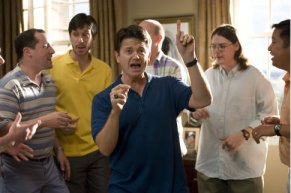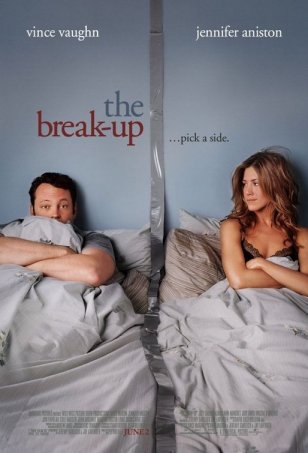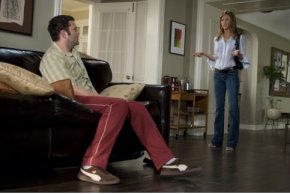|
The
Break-up
Break-ups are always tough and this one is no different.
This isn’t to say that the film is terrible by any
stretch of the imagination. Peyton Reed’s work here
is true and honest, almost to a fault. The depths of which
this story plumbs are a little too real for some to really
sit through without squirming at times.
Again,
this isn’t to say the film is bad. It’s actually
quite good, as uncomfortable as it may be at times. You
see, not to call upon stereotypes or anything, but based
on this fanboy’s experience it’s pretty safe
to say that we’ve all found ourselves in Gary Grabowski’s
(Vince Vaughn) shoes at one point or another.
Well,
those of us who’ve had girlfriends, that is.
Sure,
it’s a low blow, but it’s funny. It’s
this sort of mixture that the script by Jay Lavendar and
Jeremy Garelick blends to uneasy perfection. Is it funny?
Sure, but the reality always keeps the gags grounded, keeping
them from veering off too deep into any sort of situational
comedic riffs the Frat-Pack has become so synonymous with.
The
premise is fairly simple. The trailer would have you believe
that the plot centers around Gary’s separation from
Brooke Meyers (Jennifer Aniston), a rough decision to part
ways that leads to a game of one-upmanship in an effort
to keep their beloved apartment. It does, sort of, but what
really takes front and center is the elements of the actual
break-up, the bad decisions each one makes that helps perpetuate
the split, and the stubborn pride that leaves them to an
uneasy crossroads in the final act.
Yes,
the film actually sticks to its guns and delivers on the
promise of its title. Gary and Brooke split up, realize
their emotions rushed them into the predicament, and then
attempt to win one another back in a passive aggressive
bout of tit for tat.
What
makes the pill tougher to swallow is Reed’s attention
to the details. Either Reed, or his spectacular second unit,
places a large amount of emphasis in the minor fringe details
that make these splits so much more difficult to stomach.
The
opening sequence features some of the best secondary photo
work ever used in a romantic comedy of this ilk. The photos
depict Brooke and Gary in various circumstances that look
like anyone else’s collection of photos: bar night
with friends, Halloween parties, vacations, photos taken
of unsuspecting partners, candids with funny faces, and
rounds of board games with the gang.
The
photos are so realistic that they look as though the cast
spent their time being these characters during the downtime
on the set, and someone simply snapped photos of them doing
so.
Nothing
in the world can be more uncomfortable than a tiff that
erupts during a dinner party with friends or family, and
Reed begins our journey with this very concept. In arguments
it is often true that both parties, to some degree, are
at fault in some fashion. That said, and excepting that
Brooke is accountable to some extent, Gary is a grade-A
jerkoff.
He’s
the typical man we all hope, deep down, that we are not
really like. He ignores Brooke’s dedication, the load
she carries, and the fact that she pulls this ship along
more often than he picks up a PS2 controller.
Reed
places scenes in sequences that help his viewers along,
depicting first Gary’s day job, performing as a bus
tour guide for tourists in Chicago. We then cut to Brooke,
the manager of an art gallery for an eccentric and self-absorbed
artist named Marilyn Dean (Judy Davis).
Marilyn
and Gary have something in common in that they both place
their needs and wants before Brooke's. However, in time
we learn that Marilyn is capable of recognizing the error
of her ways, and instead of playing out her part in a typical
“bitch boss” secondary fashion, Davis brings
a level of redemption to Marilyn that Vaughn’s Gary
is merely incapable of.
We then
cut to Brooke at home, preparing a dinner party for their
respective families. Gary returns home from work with the
incorrect number of lemons needed for a centerpiece, and
proceeds to ignore Brooke’s pleas for help while citing
“down time” as an out. This escalates into the
fight that splits the couple up, but what is interesting
is how Gary is unable to see past the little details of
the fight, while Brooke is incapable of expressing to Gary
why these little things add up into a greater, more meaningful,
feeling of being taken for granted.
 |
Because
Reed’s work so effectively eviscerates the dynamics
of relationships on the brink, the marketing campaign boasting
a lighthearted romp of a split actually acts as a disservice
to the film. As stated before, the film has its moments,
most notably the interactions between Gary and his best
friend Johnny O (Jon Favreau), who seems to not only serve
as the sidekick, but the person who puts things into perspective
even when the light at the end of the tunnel has faded.
In the
end, no amount of laughs will elevate this film from what
it is, a deft look at the inner workings of failed communication,
to the comedy it purports itself to be.
Rating:

|









